Related Research Articles
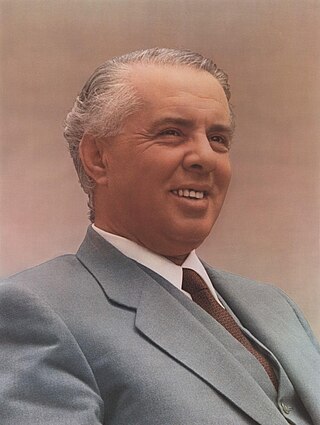
Enver Hoxha was an Albanian politician who was the ruler of Albania from 1944 until his death in 1985. He was the First Secretary of the Party of Labour of Albania from 1941 until his death, a member of its Politburo, chairman of the Democratic Front of Albania, and commander-in-chief of the Albanian People's Army. He was the twenty-second prime minister of Albania from 1944 to 1954 and at various times was both foreign minister and defence minister of the country.

Koçi Xoxe was an Albanian politician who served as Deputy Prime Minister and Minister of the Interior of the People's Socialist Republic of Albania. He was supported by Yugoslav leader Josip Broz Tito during efforts to bring Albania into the Yugoslav federation. After Albania's leader, Enver Hoxha, established the country's independence with the support of the Soviet Union, Xoxe was arrested, tortured and executed.

Omer Nishani was an Albanian medical doctor and political figure involved first in the struggle against Ahmet Zogu in the 1920s and 1930s, and then in the struggle against the fascist occupation of Albania during the 1942–44 period, becoming Chairman of the Presidium of the People's Assembly of the People's Republic of Albania in 1946 and serving in this position until 1953.
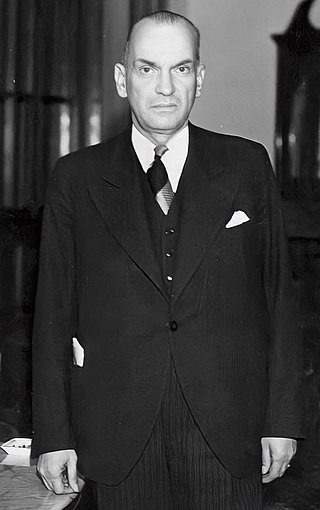
Rexhep Mitrovica was a Prime Minister of Albania's government under Nazi Germany. A staunch nationalist, he was elected head of the Second League of Prizren.

The German occupation of Albania occurred between 1943 and 1944 during World War II. Before the armistice between Italy and the Allied armed forces on 8 September 1943, Albania had been in a de jure personal union with and was de facto under the control of the Kingdom of Italy. After the armistice and the Italian exit from the Axis, German military forces entered Albania and it came under German occupation, creating the client-state, the Albanian Kingdom.
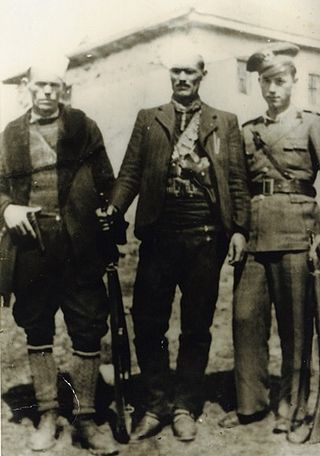
Xhemail Hasani, known as Xhem Hasa and Xhem Gostivari, was an Albanian nationalist and Axis collaborator, in charge of the Balli Kombëtar's activities in the western regions of Yugoslav Macedonia, a part of Yugoslavia occupied by Fascist Italy and Nazi Germany during World War II.
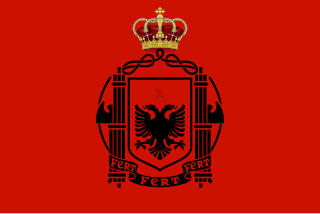
The Italian colonists in Albania were Italians who, between the two World Wars, moved to Albania to colonize the Balkan country for the Kingdom of Italy.

The National Liberation Movement, also translated as National Liberation Front, was an Albanian communist resistance organization that fought in World War II. It was created on 16 September 1942, in a conference held in Pezë, a village near Tirana, and was led by Enver Hoxha. Apart from the figures which had the majority in the General Council it also included known nationalists like Myslim Peza. In May 1944, the Albanian National Liberation Front was transformed into the government of Albania and its leaders became government members, and in August 1945, it was replaced by the Democratic Front.

Beqir Balluku was an Albanian politician, military leader, and Minister of Defense of Albania. Balluku assisted Enver Hoxha in carrying out the 1956 purge within the Party of Labour. However, in 1974, Balluku himself, along with a group of other government members was accused by Hoxha of an attempted coup d'état against the Albanian People's Republic. He was executed the next year.
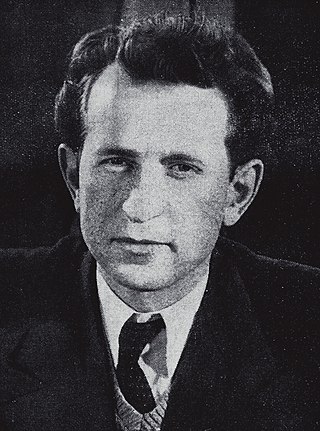
Tuk Jakova was an Albanian politician in the People's Republic of Albania. He served as Chairman of the Constituent Assembly, Minister of Finance, Minister of Interior, and twice as Vice-Prime Minister.

Manush Myftiu was an Albanian politician during the country's socialist period. He served in a number of positions, most recently as the deputy prime minister.

Viceré Marchese Francesco Jacomoni di San Savino was an Italian diplomat and minister to Albania before World War II. He was appointed governor of the Italian protectorate of Albania after its Invasion.

Abaz Kupi or Abas Kupi. He was also known as Bazi i Canës. He was an Albanian military officer.

Mirash Ivanaj was an Albanian politician, minister and school director, famous for his role in reforming education system in Albania.
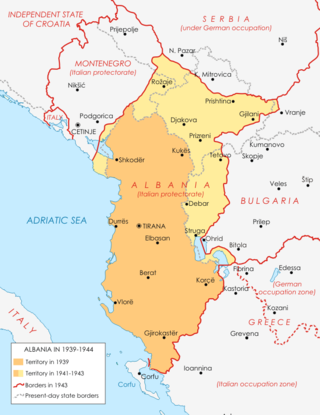
Liberation Day in Albania is commemorated as the day, November 29, 1944, in which the country was liberated from Nazi Germany forces by the Albanian resistance during World War II.

Vasil Shanto, called Vasko was one of the founders of the Albanian Communist Party. He was the leader, along with Qemal Stafa, of the Shkodër communist group. One of the delegates of the party, he was frequently sent to meet with the Yugoslavian Communist Party.

Vojo Kushi was an Albanian and Yugoslav communist guerilla fighter (partisan) and one of the founders of the Communist group based in Shkodër, following the Italian occupation of Albania in April 1939. He was proclaimed a National Hero of Yugoslavia by the Yugoslav communist government on February 12, 1945, and then a Hero of Albania by the Albanian communist government in 1946.
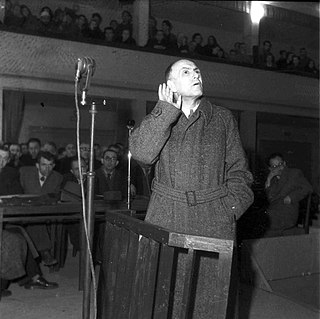
The Special Court for War Criminals and Enemies of the People, usually referred only as The Special Court, was a Socialist court set up during the spring of 1945 in the newly established Socialist Albania, which carried on the trial against those labeled as "people's enemies" and "war criminals". It was based on a decision taken by the Anti-Fascist Council of National Liberation on 25 December 1944. Like the rest of the Eastern Europe, the purge against fascists and war criminals became a central part of the construction of society based on the Soviet model.

Athanas Spiru, known as Nako Spiru, was an Albanian politician and high-ranking official of the Communist Party of Albania (PKSh). He served as Minister of Economy and Industry from 1946 until his untimely death the following year.

Mustafa Gjinishi was an Albanian communist from Peqin, central Albania. He was known for having opposed Enver Hoxha and the Italian invasion of Albania.
References
- ↑ Albania as dictatorship and democracy: from isolation to the Kosovo War, 1946-1998, Volume 3 of Albania in the twentieth century, Owen Pearson Volume 3 of Albania and King Zog, Owen Pearson Author Owen Pearson Edition illustrated Publisher I.B.Tauris, 2007 ISBN 1-84511-105-2, ISBN 978-1-84511-105-2 p. 343
- ↑ Albania as dictatorship and democracy: from isolation to the Kosovo War, 1946-1998 Volume 3 of Albania in the twentieth century, Owen Pearson Volume 3 of Albania and King Zog, Owen Pearson Author Owen Pearson Edition illustrated Publisher I.B.Tauris, 2007 ISBN 1-84511-105-2, ISBN 978-1-84511-105-2 p. 461
- ↑ Communism in Eastern Europe Volume 328 of Midland books Author Teresa Rakowska-Harmstone Editor Teresa Rakowska-Harmstone Edition 2, illustrated, revised Publisher Indiana University Press, 1984 ISBN 0-253-31391-0, ISBN 978-0-253-31391-1 p. 218
- ↑ Albania as dictatorship and democracy: from isolation to the Kosovo War, 1946-1998 Volume 3 of Albania in the twentieth century, Owen Pearson Volume 3 of Albania and King Zog, Owen Pearson Author Owen Pearson Edition illustrated Publisher I.B.Tauris, 2007 ISBN 1-84511-105-2, ISBN 978-1-84511-105-2 p. 492
- ↑ Albania as dictatorship and democracy: from isolation to the Kosovo War, 1946-1998 Volume 3 of Albania in the twentieth century, Owen Pearson Volume 3 of Albania and King Zog, Owen Pearson Author Owen Pearson Edition illustrated Publisher I.B.Tauris, 2007 ISBN 1-84511-105-2, ISBN 978-1-84511-105-2 p. 505